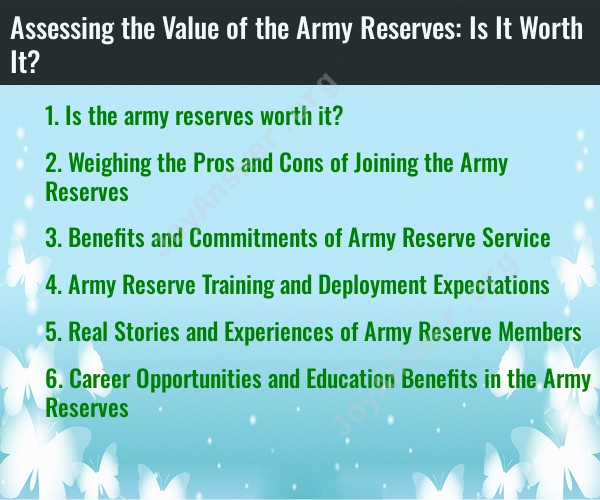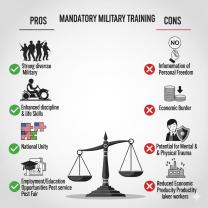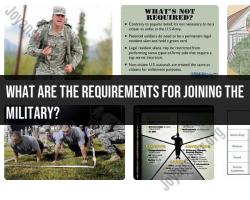Is the army reserves worth it?
Whether the Army Reserves are "worth it" depends on an individual's specific goals, circumstances, and personal values. The Army Reserves can offer various benefits, but they also come with commitments and potential challenges. Here are some factors to consider when assessing the value of the Army Reserves:
Benefits of the Army Reserves:
Service to Country: Many people join the Army Reserves out of a sense of duty and patriotism. It offers an opportunity to serve your country while maintaining a civilian career.
Training and Skills: Reservists receive training and gain valuable skills, including leadership, discipline, and technical abilities. This training can be useful in civilian jobs.
Educational Opportunities: The Army Reserves can help pay for education through the Montgomery GI Bill or the Tuition Assistance Program, which can reduce the financial burden of college or vocational training.
Healthcare and Benefits: Reservists may be eligible for healthcare benefits through TRICARE and access to military facilities, commissaries, and exchanges.
Retirement Benefits: Reservists who serve a certain number of years can qualify for retirement benefits, though these are different from active-duty retirement benefits.
Community and Camaraderie: Being part of the military community can provide a sense of belonging and camaraderie. Many reservists build strong relationships with their fellow soldiers.
Challenges and Considerations:
Time Commitment: The Army Reserves require a significant time commitment, including drill weekends, annual training, and potential deployments. This can impact work, family, and personal life.
Deployments: Depending on the unit and role, reservists may be deployed, which can be challenging for both the individual and their family.
Physical Demands: Reservists must meet physical fitness standards and maintain readiness, which may require ongoing training.
Employment: Balancing a civilian career with military commitments can be challenging. It's essential to have a supportive employer or career plan that accommodates your service.
Risk and Duty: Reservists can be called to active duty during times of crisis or conflict, which may involve risks and extended periods away from home.
Personal Values: Consider whether the values, culture, and mission of the military align with your personal beliefs and goals.
Whether the Army Reserves are worth it depends on your personal and professional objectives. It's advisable to thoroughly research the Army Reserves, talk to current or former reservists, and discuss your decision with family and employers to ensure that you are making an informed choice. The value of the Army Reserves can be significant for those who are committed to the mission, willing to fulfill their responsibilities, and appreciate the benefits and opportunities it offers.
Weighing the Pros and Cons of Joining the Army Reserves
Before deciding to join the Army Reserves, it's crucial to carefully consider the pros and cons to ensure it aligns with your personal and professional goals.
Pros:
Serving Your Country: You'll have the opportunity to serve your country and contribute to national security while maintaining your civilian life.
Flexible Schedule: The Army Reserves allow you to balance your military service with your civilian career and personal life.
Financial Benefits: You'll receive a paycheck and other financial benefits, including health insurance and education assistance.
Skill Development: You'll gain valuable skills and training, such as leadership, teamwork, and technical expertise.
Travel Opportunities: You may have opportunities to travel and experience different cultures through deployments and training exercises.
Cons:
Time Commitment: You'll be required to attend regular training meetings and weekend drills, which can impact your personal time.
Deployment Potential: You may be deployed to active duty for extended periods, which can disrupt your civilian life and career.
Physical Demands: Military service involves physical training and demanding activities that require a certain level of fitness.
Mental and Emotional Challenges: Military service can be stressful and demanding, requiring mental toughness and resilience.
Family and Relationship Impact: Your military service may affect your family life and relationships.
Benefits and Commitments of Army Reserve Service
Army Reserve members enjoy various benefits while serving their country:
Pay and Allowances: Reservists receive pay based on their rank and time in service, along with allowances for housing, meals, and subsistence.
Health Insurance: Reservists are eligible for TRICARE health insurance, which covers medical, dental, and vision care for themselves and their families.
Education Benefits: Reservists can access education assistance through the GI Bill, which helps pay for college tuition, vocational training, and other education expenses.
Retirement Benefits: Reservists who serve at least 20 years are eligible for retirement benefits, including monthly payments and healthcare coverage.
In exchange for these benefits, Reservists commit to the following:
Training: Reservists must attend regular training meetings, typically one weekend per month and two weeks per year.
Deployment Readiness: Reservists must maintain a certain level of physical fitness and be prepared for potential deployments.
Availability: Reservists must be available to respond to emergencies and contingencies as needed.
Army Reserve Training and Deployment Expectations
Army Reserve training involves a combination of classroom instruction, hands-on training, and physical fitness activities. Reservists learn essential military skills, such as weapons handling, combat tactics, and survival techniques.
Deployment expectations vary depending on the unit and the current military needs. Reservists may be deployed to active duty for various missions, including peacekeeping operations, humanitarian assistance, and combat operations. Deployment lengths can range from a few weeks to several months or even years.
Real Stories and Experiences of Army Reserve Members
Numerous individuals from diverse backgrounds have served in the Army Reserves, each with their unique experiences and perspectives. Reading personal accounts and stories can provide insights into the realities of Army Reserve life, including the challenges, rewards, and impact on their lives.
Career Opportunities and Education Benefits in the Army Reserves
The Army Reserves offer various career opportunities in various fields, including healthcare, administration, logistics, and engineering. Reservists can gain valuable training and experience that can enhance their civilian careers.
The Army Reserves also provide education benefits to help Reservists pursue their education goals. The GI Bill offers financial assistance for tuition, books, and other education expenses. Additionally, many employers offer additional education benefits to Reservists.
Joining the Army Reserves is a significant decision that requires careful consideration of your personal and professional goals. By weighing the pros and cons, understanding the commitments and benefits, and exploring real-life experiences, you can make an informed decision about whether Army Reserve service is the right path for you.












